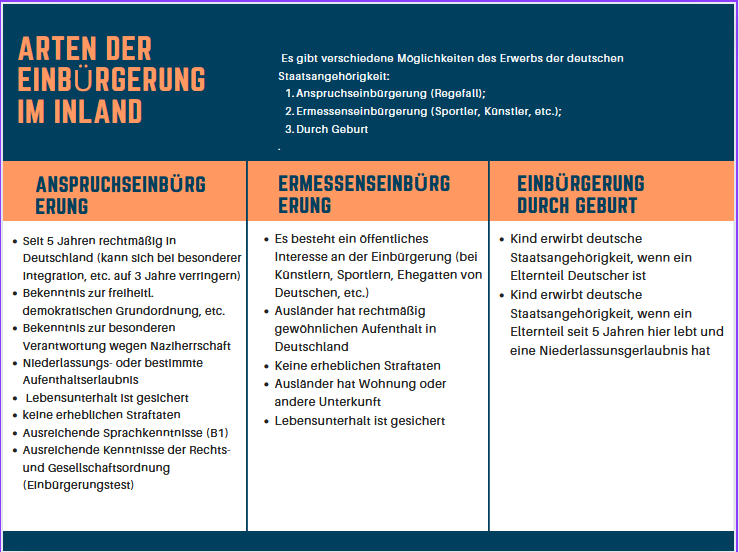Administrative Court of Munich, February 27, 2019, Case No.: M 25 K 18.5262
In the Munich Administrative Court case discussed here, the applicant applied for naturalisation. However, the applicant for naturalisation had committed criminal offences.
Facts of the Case:
Plaintiff Came to Germany as a Refugee
The plaintiff entered Germany on December 1, 1994, and applied for asylum, which was rejected on December 19, 1994. However, following a ruling by the Administrative Court of Schleswig on March 31, 1999, the Federal Office for Migration and Refugees (BAMF) was required to recognize that the conditions of § 51 paragraph 1 of the Aliens Act (AuslG-1990) were met. This was confirmed in June 1999. In 2008, the BAMF revoked this recognition and demanded a Togolese passport, which the plaintiff never provided.
Since June 19, 2013, the plaintiff held a permanent settlement permit. He had been repeatedly convicted of criminal offenses, including intentional bodily harm and resistance against law enforcement officers in 2007, and another offense in 2012. These convictions were recorded in the Federal Central Register and were set to be expunged by July 2022.
Plaintiff Applied for Naturalization in the German National Association
Despite his criminal record, the plaintiff repeatedly applied for naturalization, most recently in February 2018. This application was rejected by the defendant in September 2018. The primary reason for the rejection was the plaintiff’s criminal convictions, which did not meet the requirements for naturalization under § 8 of the Nationality Act (StAG). Additionally, the plaintiff’s identity was unclear, and he had not provided sufficient proof of language proficiency.
Naturalization Authority Rejected Naturalization, Plaintiff Filed a Lawsuit
The plaintiff filed a lawsuit against the defendant’s decision. He argued that § 12a paragraph 1 sentence 3 StAG should be interpreted in his favor and that a case-by-case decision was required because his convictions did not indicate a lack of loyalty to the law. He also disputed that his convictions would be expunged by 2022.
The plaintiff claimed that the naturalization authority should have required him to prove his missing language and legal knowledge. Additionally, he argued that the earlier version of the StAG should apply because the conviction was based on events from 2006. He demanded a discretionary decision in his favor, arguing that naturalization, given his long residence and integration, would prevent particular hardship.
Decision of the Munich Administrative Court
VG Munich Confirmed the Authority’s Decision
The Administrative Court of Munich dismissed the lawsuit, ruling that the plaintiff had no entitlement to naturalization. The applicable legal situation for the entitlement to a naturalization assurance was the StAG in the version of October 11, 2016. The requirements for naturalization were not met because § 8 StAG does not constitute a mandatory legal basis, and there were no indications that the discretion was reduced to zero.
Plaintiff Had Committed Too Many Crimes
The plaintiff had been sentenced to a total of 320 daily fines, which significantly exceeded the threshold of insignificance under § 12a paragraph 1 sentence 1 No. 2 StAG. This was not a minor excess, so the convictions could not be disregarded.
In This Case, the Requirements of § 8 Paragraph 2 StAG Were Also Not Met
The court found that neither a public interest nor particular hardship under § 8 paragraph 2 StAG justified naturalization despite the convictions. There was no specific state interest or extraordinary integration achievements on the part of the plaintiff. The long duration of his stay in Germany was also insufficient to justify particular hardship.
The court emphasized that atypical circumstances must be present to trigger particular hardship due to the denial of naturalization. Such circumstances did not exist for the plaintiff. The last conviction significantly exceeded the threshold for trivial offenses, making a positive decision impossible.
Summary
The Administrative Court of Munich ruled that the plaintiff was not entitled to naturalization due to his criminal convictions. The requirements for naturalization under § 8 StAG were not met, and there were no grounds for a discretionary decision in the plaintiff’s favor. Neither the duration of his stay nor his integration was sufficient to override the legal requirements. Therefore, the rejection of naturalization remained in place.

Source: Munich Administrative Court
Important Note: The content of this article has been prepared to the best of our knowledge and belief. However, due to the complexity and constant evolution of the subject matter, we must exclude liability and warranty. Important Notice: The content of this article has been created to the best of our knowledge and understanding. However, due to the complexity and constant changes in the subject matter, we must exclude any liability and warranty.
If you need legal advice, please feel free to call us at 0221 - 80187670 or send us an email to info@mth-partner.de
Lawyers in Cologne advise and represent clients nationwide in immigration law.



